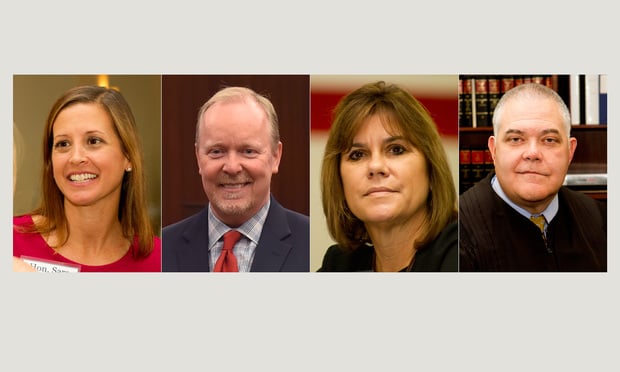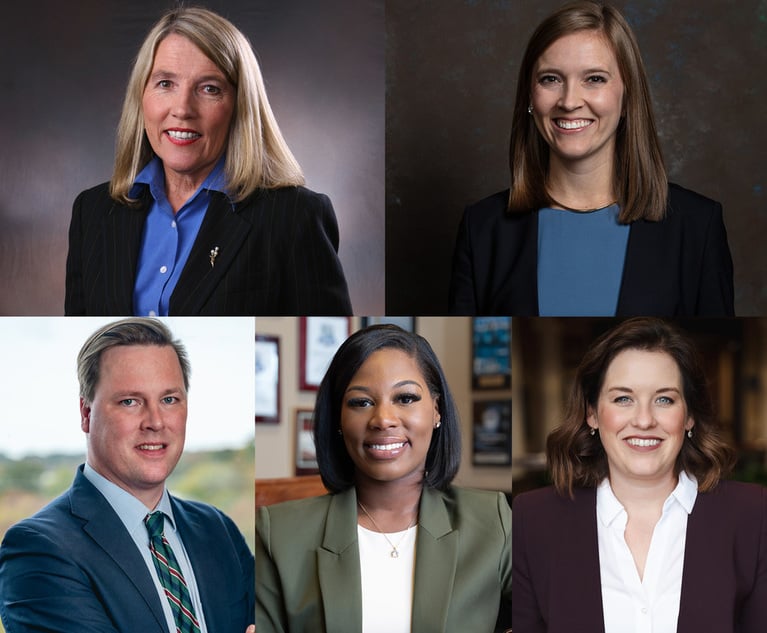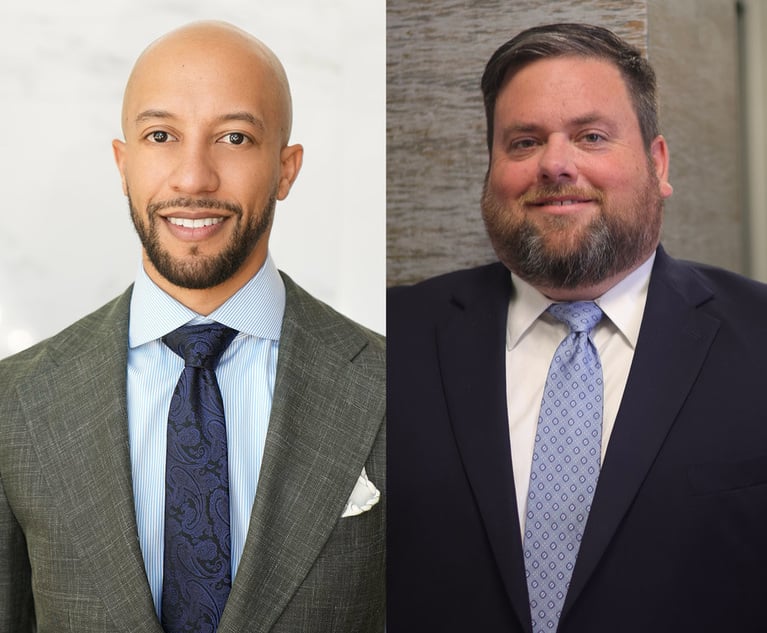Three Paths at Different Speeds Will Determine Justice's Replacement
One process is in Gov. Brian Kemp's office, while two sets of litigation to force an election to choose Blackwell's successor are going forward, and in the most advanced case, the state Supreme Court announced Friday that a ruling may not come soon.
April 03, 2020 at 04:24 PM
5 minute read
 Presiding Judge Sara L. Doyle of the Court of Appeals of Georgia (from left), Judge LaTain Kell of Cobb County Superior Court, Judge Shawn LaGrua of Fulton County Superior Court and Judge Wade Padgett of the Augusta Judicial Circuit Superior Court. (Courtesy photos)
Presiding Judge Sara L. Doyle of the Court of Appeals of Georgia (from left), Judge LaTain Kell of Cobb County Superior Court, Judge Shawn LaGrua of Fulton County Superior Court and Judge Wade Padgett of the Augusta Judicial Circuit Superior Court. (Courtesy photos)
Three processes—one in Gov. Brian Kemp's office and two in federal and state courts—are moving at different speeds to determine who will fill a seat on the Supreme Court of Georgia being vacated in November by Justice Keith Blackwell.
Kemp's Judicial Nominating Commission took less than a month to send him a shortlist of four judges from which to choose Blackwell's replacement. Their applications, which include answers to questions about their most important cases and other issues, can be seen by clicking on the finalists' names below (the JNC redacted certain personal information).
- Presiding Judge Sara L. Doyle of the Court of Appeals of Georgia;
- Judge LaTain Kell of Cobb County Superior Court;
- Judge Shawn LaGrua of Fulton County Superior Court; and
- Judge Wade Padgett of the Augusta Judicial Circuit Superior Court.
Simultaneously, two sets of litigation to force an election to choose Blackwell's successor are going forward. In the most advanced case, the state Supreme Court announced Friday that a ruling might not come soon.
Former U.S. Rep. John Barrow, a Democrat, and former state Rep. Beth Beskin, a Republican, are suing to force Secretary of State Brad Raffensperger to reinstate the May 19 election for Blackwell's seat. Three voters on March 31 brought similar arguments to federal court, claiming like Barrow and Beskin that the public has a right to fill Blackwell's seat since he won't resign until November, six months after he was scheduled to run for election.
Last month, Judge Emily Richardson of Fulton County Superior Court rejected Barrow and Beskin's arguments that Raffensperger must reinstate the election and reopen qualifying for Blackwell's seat.
Richardson held the two would-be candidates for the post failed to show they had "a clear right" to compel Raffensperger to conduct an election "when there is a legal vacancy in a position that will be filled by gubernatorial appointment prior to the beginning of the term for which the election would be held."
Barrow and Beskin had argued that, since the Georgia Constitution was revised in 1983, there had never been a circumstance where the secretary of state canceled an election for public office that would remain occupied by the incumbent through or past the date of the election. But the judge determined that a vacancy existed for Blackwell's seat the day he submitted his resignation letter in February and Kemp accepted it.
Barrow and Beskin have appealed to the state Supreme Court—which now comprises five temporary justices for members who recused, including Blackwell—and Chief Justice Harold Melton, Presiding Justice David Nahmias and Justice Sarah Warren, who did not recuse.
That mixed body on Friday suggested it would not rule until after the May 19 election, stating the court had, after reviewing briefs, "determined that it could provide adequate remedies to the appellants in the event they prevail (a matter as to which the Court expresses no opinion whatsoever at this time) even after absentee ballots are distributed for the May 19, 2020, nonpartisan general election."
"Accordingly," the order stated, "the Court will not issue an immediate opinion in these cases, although an opinion will be issued as soon as practicable."
Cary Ichter, representing Beskin, said, "We are pleased that the court appears to be giving the case the serious consideration it deserves. This is also a sign that the court accepts that it is empowered to direct Secretary Raffensperger to re-open qualifying and conduct the election at some time after the May election occurs. Given that Justice Blackwell will still occupy his seat on the bench when the July and November elections occur, the seat will not be vacant; the governor's power to appoint will not be triggered; and an election for the seat will be required by law."
One of Barrow's lawyers, Lester Tate, said no immediate ruling by the high court may prompt his client to intervene in the federal case and issue "litigation hold letters."
"We have long believed it was necessary to develop the full factual scenario, with subpoenas and testimony from all involved, that led to this deprivation of the public's right to elect a justice. Since no immediate ruling has been forthcoming, it is imperative that we examine every avenue to do that now. The governor seems to be moving forward with the potential announcement of an appointment while the court ponders our case."
A comment from the governor's office on when he might name an appointment could not be obtained. Nor could comments from the state attorney general's office or a lawyer for the voters in the federal case, Bruce Brown.
That case was assigned to Senior Judge Orinda Evans.
This content has been archived. It is available through our partners, LexisNexis® and Bloomberg Law.
To view this content, please continue to their sites.
Not a Lexis Subscriber?
Subscribe Now
Not a Bloomberg Law Subscriber?
Subscribe Now
NOT FOR REPRINT
© 2025 ALM Global, LLC, All Rights Reserved. Request academic re-use from www.copyright.com. All other uses, submit a request to [email protected]. For more information visit Asset & Logo Licensing.
You Might Like
View All
'Didn't Notice Patient Wasn't Breathing': $13.7M Verdict Against Anesthesiologists
12 minute read
Trial Court Had No Authority to Reopen Voir Dire After Jury Impaneled in Civil Case, State Appellate Court Rules

'Pushed Into Oncoming Traffic': $5.85M Settlement in Mediated Auto Tort
6 minute readTrending Stories
- 1The Gold Standard: Remembering Judge Jeffrey Alker Meyer
- 2NJ Supreme Court Clarifies Affidavit of Merit Requirement for Doctor With Dual Specialties
- 3Whether to Choose State or Federal Court in a Case Involving a Franchise?
- 4Am Law 200 Firms Announce Wave of D.C. Hires in White-Collar, Antitrust, Litigation Practices
- 5K&L Gates Files String of Suits Against Electronics Manufacturer's Competitors, Brightness Misrepresentations
Who Got The Work
J. Brugh Lower of Gibbons has entered an appearance for industrial equipment supplier Devco Corporation in a pending trademark infringement lawsuit. The suit, accusing the defendant of selling knock-off Graco products, was filed Dec. 18 in New Jersey District Court by Rivkin Radler on behalf of Graco Inc. and Graco Minnesota. The case, assigned to U.S. District Judge Zahid N. Quraishi, is 3:24-cv-11294, Graco Inc. et al v. Devco Corporation.
Who Got The Work
Rebecca Maller-Stein and Kent A. Yalowitz of Arnold & Porter Kaye Scholer have entered their appearances for Hanaco Venture Capital and its executives, Lior Prosor and David Frankel, in a pending securities lawsuit. The action, filed on Dec. 24 in New York Southern District Court by Zell, Aron & Co. on behalf of Goldeneye Advisors, accuses the defendants of negligently and fraudulently managing the plaintiff's $1 million investment. The case, assigned to U.S. District Judge Vernon S. Broderick, is 1:24-cv-09918, Goldeneye Advisors, LLC v. Hanaco Venture Capital, Ltd. et al.
Who Got The Work
Attorneys from A&O Shearman has stepped in as defense counsel for Toronto-Dominion Bank and other defendants in a pending securities class action. The suit, filed Dec. 11 in New York Southern District Court by Bleichmar Fonti & Auld, accuses the defendants of concealing the bank's 'pervasive' deficiencies in regards to its compliance with the Bank Secrecy Act and the quality of its anti-money laundering controls. The case, assigned to U.S. District Judge Arun Subramanian, is 1:24-cv-09445, Gonzalez v. The Toronto-Dominion Bank et al.
Who Got The Work
Crown Castle International, a Pennsylvania company providing shared communications infrastructure, has turned to Luke D. Wolf of Gordon Rees Scully Mansukhani to fend off a pending breach-of-contract lawsuit. The court action, filed Nov. 25 in Michigan Eastern District Court by Hooper Hathaway PC on behalf of The Town Residences LLC, accuses Crown Castle of failing to transfer approximately $30,000 in utility payments from T-Mobile in breach of a roof-top lease and assignment agreement. The case, assigned to U.S. District Judge Susan K. Declercq, is 2:24-cv-13131, The Town Residences LLC v. T-Mobile US, Inc. et al.
Who Got The Work
Wilfred P. Coronato and Daniel M. Schwartz of McCarter & English have stepped in as defense counsel to Electrolux Home Products Inc. in a pending product liability lawsuit. The court action, filed Nov. 26 in New York Eastern District Court by Poulos Lopiccolo PC and Nagel Rice LLP on behalf of David Stern, alleges that the defendant's refrigerators’ drawers and shelving repeatedly break and fall apart within months after purchase. The case, assigned to U.S. District Judge Joan M. Azrack, is 2:24-cv-08204, Stern v. Electrolux Home Products, Inc.
Featured Firms
Law Offices of Gary Martin Hays & Associates, P.C.
(470) 294-1674
Law Offices of Mark E. Salomone
(857) 444-6468
Smith & Hassler
(713) 739-1250







